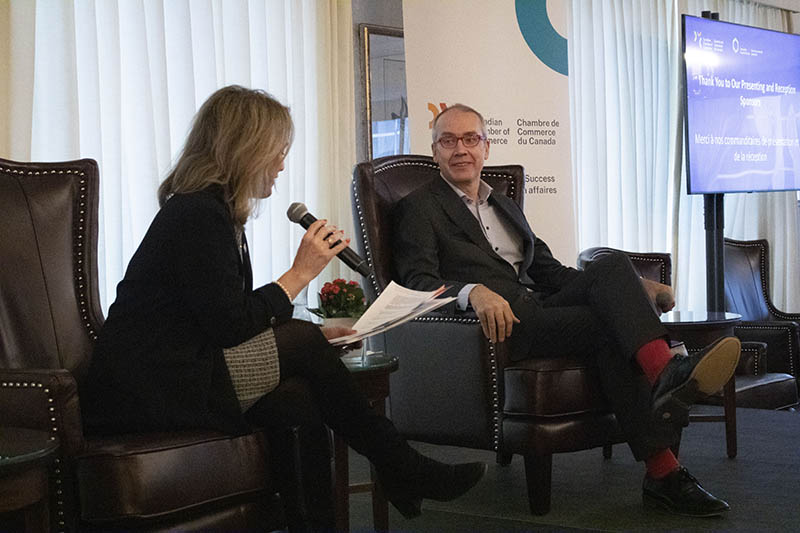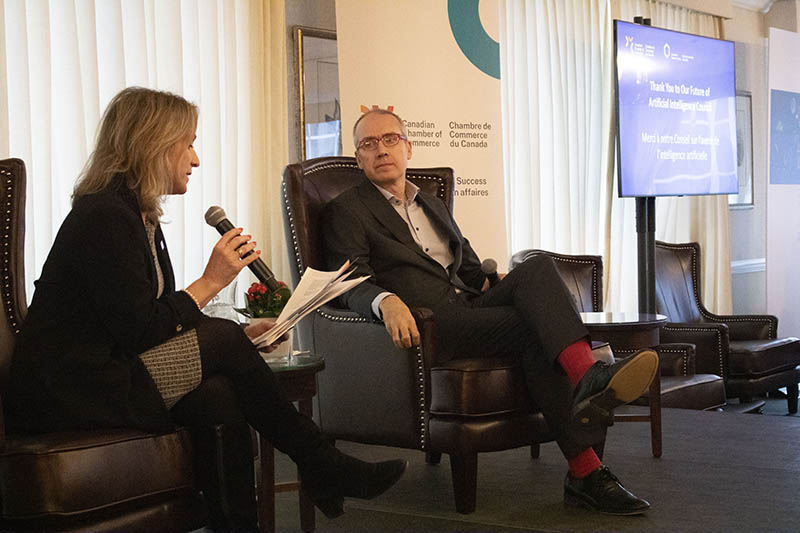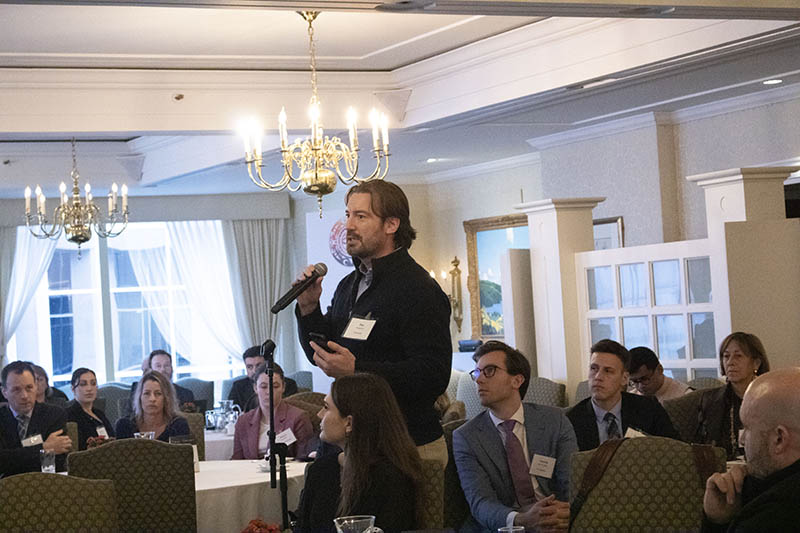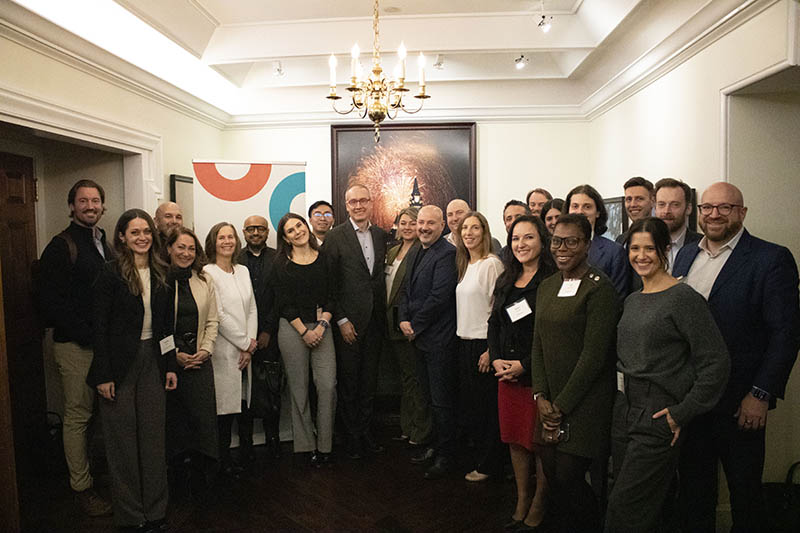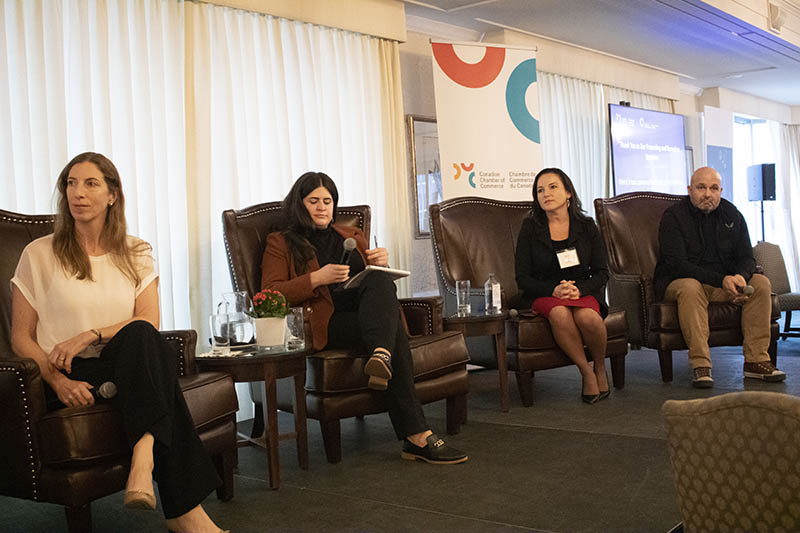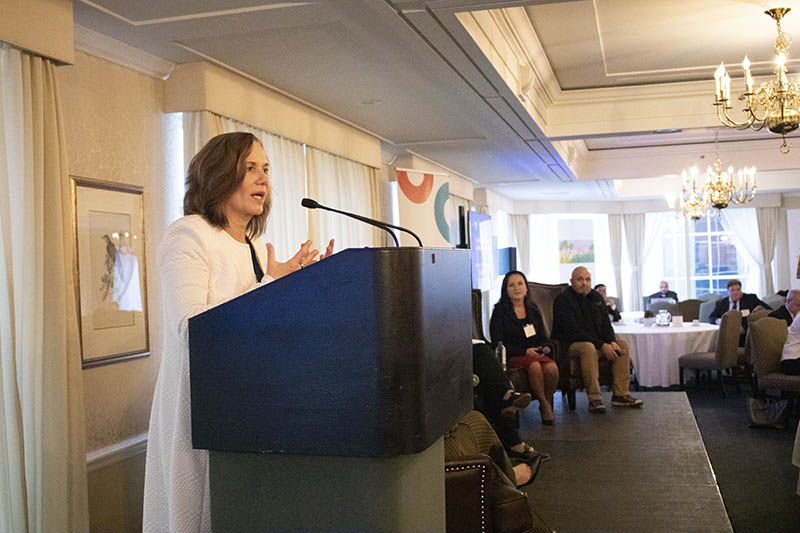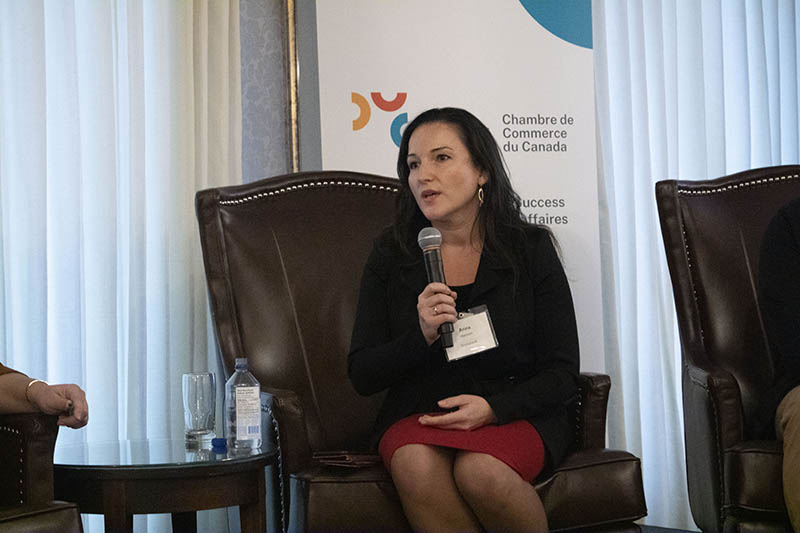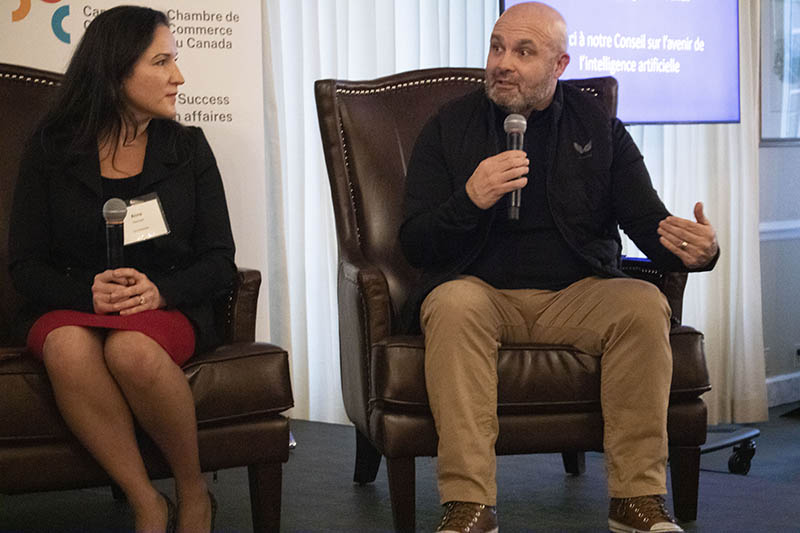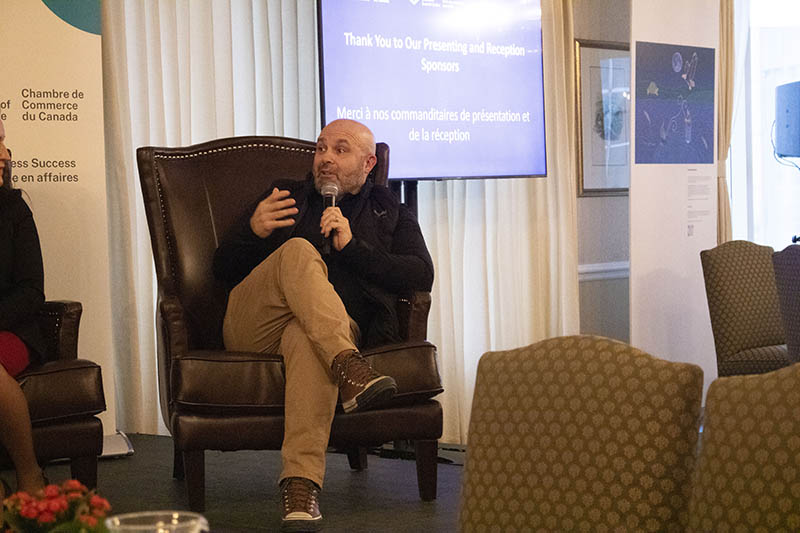Blog /
Balancing the Risks and Benefits: Insights from our Artificial Intelligence Executive Summit
Balancing the Risks and Benefits: Insights from our Artificial Intelligence Executive Summit
On November 22, 2023, the Canadian Chamber of Commerce hosted the Artificial Intelligence Executive Summit at The Rideau Club to tackle this critical topic. The Summit provided an opportunity for business leaders and stakeholders to engage on the transformative potential of AI while also taking a closer look at the ethical and responsible adoption and development of the technology.
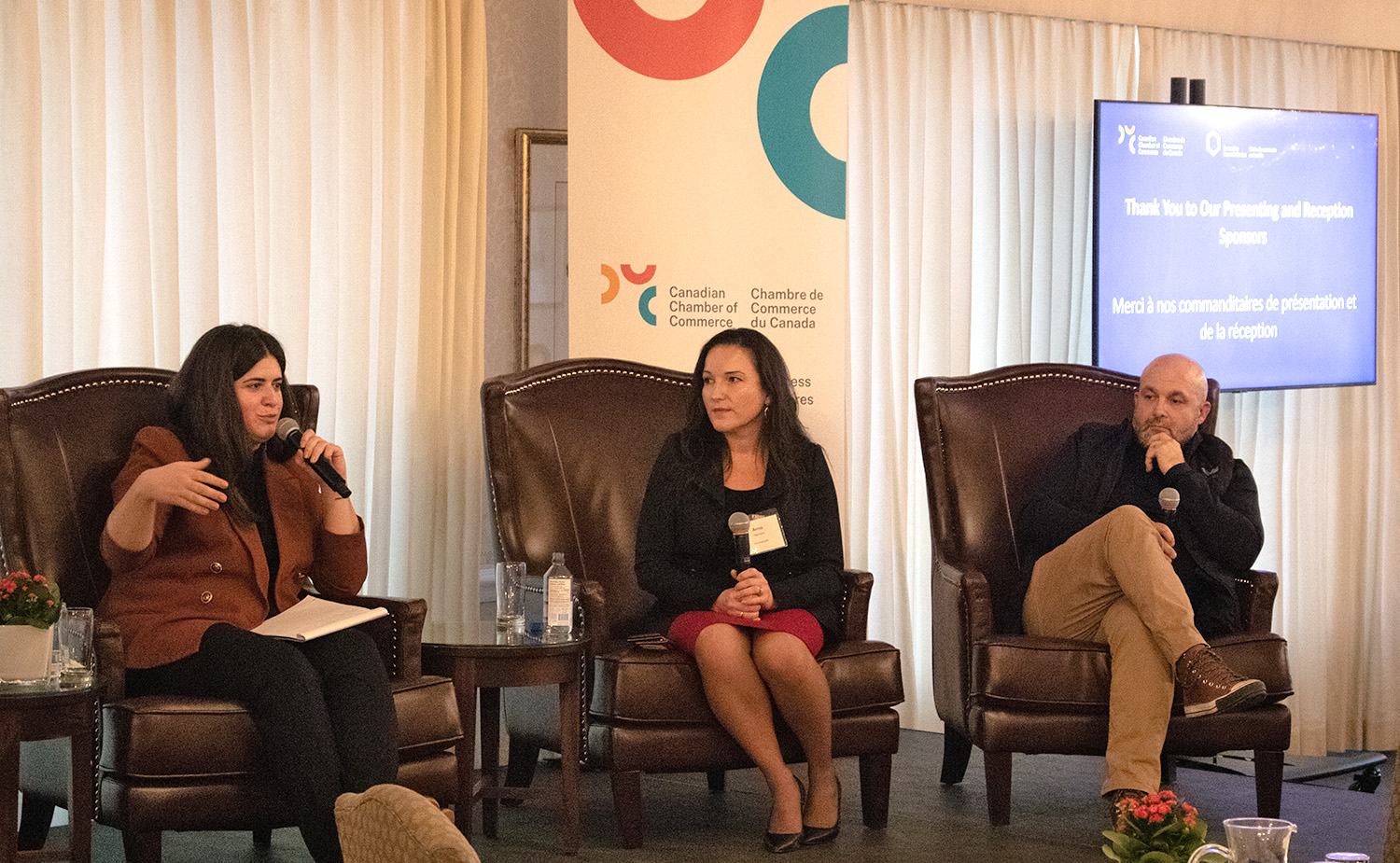
It will be incumbent on policymakers to champion the ethical and responsible uses of AI grounded in Canadian values of fairness, equity and social responsibility. Values that move us beyond safeguards for technical compliance to a deeper commitment of responsibility, trustworthiness, and ethical AI practices.
Deputy Minister Simon Kennedy
On November 22, 2023, the Canadian Chamber of Commerce hosted the Artificial Intelligence Executive Summit at The Rideau Club to tackle this critical topic. The Summit provided an opportunity for business leaders and stakeholders to engage on the transformative potential of AI while also taking a closer look at the ethical and responsible adoption and development of the technology.
After a welcome from The Future of AI Council Lead, Ulrike Bahr-Gedalia, Senior Director, Digital Economy, Technology & Innovation, Canadian Chamber of Commerce, and introduction by Nicole Foster, Director of AWS Global AI/ML and Canada Public Policy, Amazon, the summit kicked off with a keynote address and fireside chat with Deputy Minister Simon Kennedy of Innovation, Science, and Economic Development Canada, moderated by Catherine Fortin LeFaivre, Vice President, Strategic Policy & Global Partnerships, Canadian Chamber of Commerce. Topics explored by Deputy Minister Kennedy, including responsibly regulating AI while still encouraging broader adoption, spilled into the panel discussion (moderated by Yana Lukasheh, VP, Government Affairs and Business Development, SAP Canada, and Future of AI Council Co-Chair) featuring Gabriel Batstone, Co-founder and CEO, Contextere; Jennifer Boger, Chief Scientific Officer, ESGai Technologies; Christine Guyot, Director, Corporate Affairs, Microsoft; and Anna Hannem, VP, Data and AI Risk, Scotiabank. After the keynote and panel, in-person guests were invited to network.
Key Themes and Insights

Keeping Our Edge by Translating AI into the Economy
Canada will only maintain its lead and leadership in the AI space if we match research with more action. Canada is a significant AI researcher, but we need to translate AI into the economy and that can only happen through adoption. Unfortunately, Canada invests in technology at a lower rate than some of our global competitors and G7 peers. Our slow rate of digital adoption has been worrying for many years, but the addition of AI takes it to a new level.

Increasing Adoption Rates through Trust and Literacy
As AI has become more pervasive in the economy, Canadians have become more conscious of the potential impacts on their lives — positive and negative — but consciousness does not necessarily equate understanding as to how AI is being used. The lack of broader AI adoption is partially due to a literacy issue — once people understand the technology, what it is and what it is not, and how important it is, adoption rates will increase. Universities, trade schools and polytechnics will all play a crucial role in AI literacy and education. But adoption also depends on Canadians trusting that the technology will be used for good. Fostering public trust requires transparency, accountability and the development of common standards. Of note is that Indigenous communities seem to adopt AI at a much higher rate than the “average Canadian population”.

Striking the Right Balance between Risks and benefits
Leveraging the significant power of AI in our economy and society is a complex challenge. We want to address the risks without losing the benefits of AI. Creating a balanced framework will help build public trust and encourage ethical use of AI, while also being as unintrusive as possible. But part of striking the right balance also means agreeing on or clarifying definitions: what exactly defines high-impact or a high-impact system? Artificial intelligence is not something to be afraid of — it’s important to get the regulations right and have a discussion around the risks, but we can’t forget to bring awareness to the many benefits and opportunities AI will create.

Responsibly Regulating AI
Regulations around AI require precision but being too prescriptive for a general-purpose technology means that by the time the regulations are passed, they’re out of date because of the rate at which the technology and world change.
Overregulation of AI can stifle innovation and discourage information sharing, but the absence of appropriate safeguards can lead to significant unintended consequences. As Deputy Minister Kennedy said, “Any set of rules where there are no consequences at all are not credible.” But in the regulatory world, the emphasis is on compliance rather than consequence when working with good-faith actors.

Leveling the Playing Field for SMEs
Impact of regulations on small businesses is different than big organizations. Integrating AI into your business, especially as an SME, can be intimidating. The more regulation, the more time and resources it takes. Being unable to allocate the resources to AI becomes a barrier to entry. AI regulations need to make sense for the size of business and the type of context they’re operating in. Just because an organization uses AI doesn’t make it a high-risk company. The role of government is to incentivize the kind of ecosystem and environment needed for SMEs to have their voices heard and to leverage training, as well as for larger tier companies to mentor and collaborate with SMEs.

Addressing the Fear of AI
Transformative tech is always disruptive, but it will have a net positive good in the end. Applying technology like AI to jobs will lead to greater productivity which leads to higher growth and thus more jobs. Also, every time there is a new innovation or transformative technology, jobs that didn’t previously exist are created. Anecdotal evidence has found that AI positively affects employee satisfaction as it allows people to focus more on what they like doing. It can also empower people to work in jobs that may have once been out of reach due to lack of traditional education. In this context, the interconnectedness of Augmented Intelligence and Artificial Intelligence is worth noting. Augmented Intelligence is a term used to describe the combination of people and AI working together to enhance human intelligence and decision making and improve the way people do work — not replace it.
The Future of AI Council
On November 6, 2023, the Canadian Chamber of Commerce launched the Future of AI Council, a 30-member forum representing a diverse cross-section of organizations from across the country. The Council will play a leading role in advocating for government policies that establish AI as a positive economic force through the responsible development, deployment and ethical use of AI in business.
We would like to acknowledge that this Summit took place on the traditional territory of the Anishinabe Algonquin Nation. The Canadian Chamber of Commerce recognizes and appreciates their historic connection to this place. We also value the contributions that Inuit, Métis, and other Indigenous Peoples have made, both in shaping and strengthening this community, province and country.
Thank You to Our Event Partners

Thank You to Our Excellence Level Partners
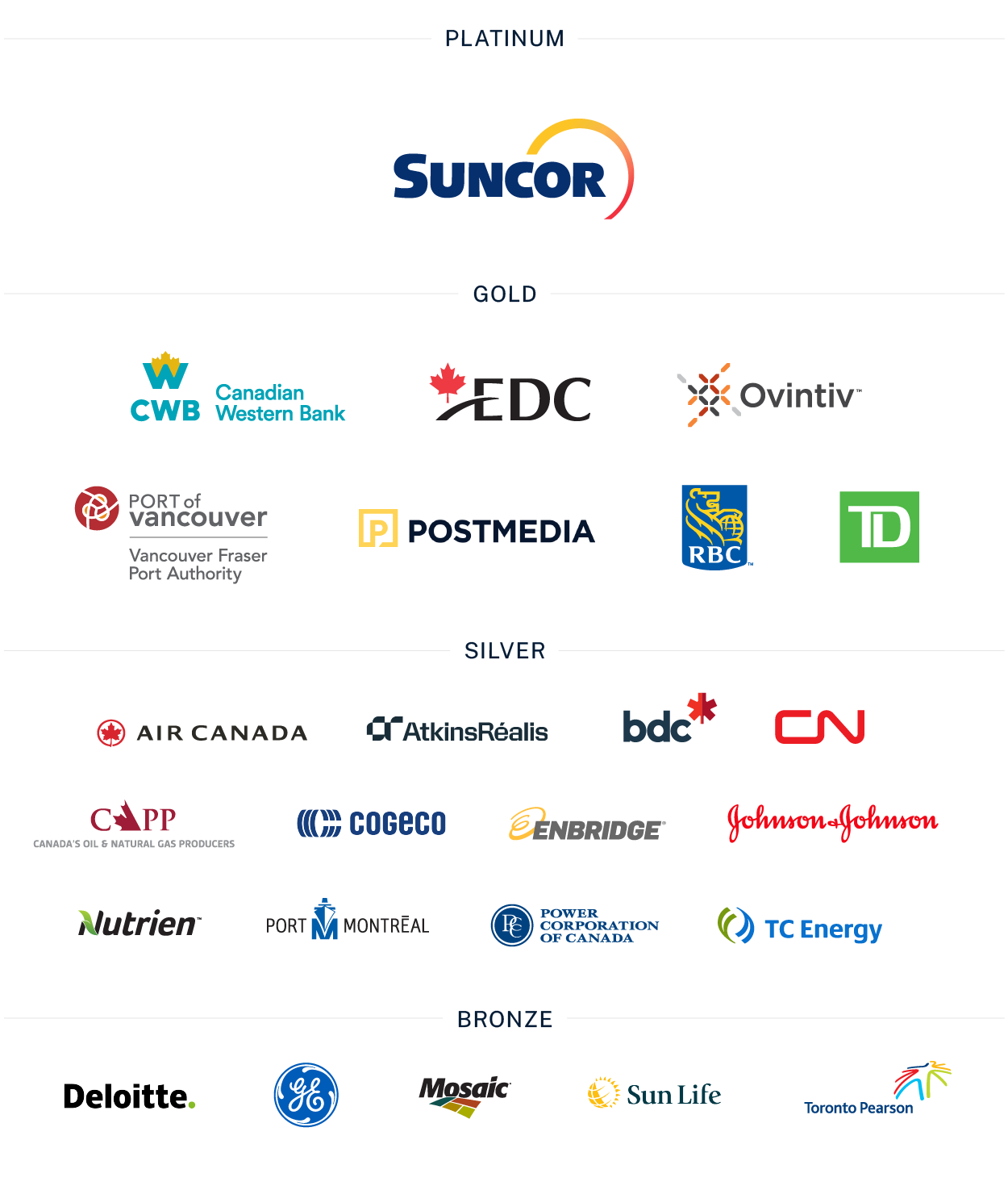
Other Blogs

Navigating Net Zero

Lodestar Structures: Revolutionizing Community Infrastructure




